Prof. Muhammad Hamid Zaman and Dr. Afreen Siddiqi
 Pakistan’s flood of 2010 was the largest in the country’s history. We still haven’t recovered from the incredible destruction of life, property and infrastructure that it left in its wake. No one can argue that if such a calamity were to occur year after year, the existence of the country would be in jeopardy. The economic impact of a 2010 like flood year after year is no different than the long-term consequence of illiteracy in Pakistan!
Pakistan’s flood of 2010 was the largest in the country’s history. We still haven’t recovered from the incredible destruction of life, property and infrastructure that it left in its wake. No one can argue that if such a calamity were to occur year after year, the existence of the country would be in jeopardy. The economic impact of a 2010 like flood year after year is no different than the long-term consequence of illiteracy in Pakistan!
This evaluation and other mind-numbing statistics were made public earlier this week by the Pakistan Education Task Force. You can find the report here. According to the report, ten percent of all the children in the world, who are not in any school, live in Pakistan. This places Pakistan second on the list of “out-of-school” children in the world. The number of children not in school in Pakistan is around seven million, which is roughly the entire population of Lahore. The numbers are even worse for adults, particularly women in rural areas, where less than a third of the female population has ever attended any school.
Our annual spending on education, which should be at least upwards of 4%, has gone down to 1.5% of our GDP. Perhaps a more shocking fact is that this amount is less than the subsidy given to PIA alone.
The report paints a very bleak, but a detailed picture of our future and our very existence as a nation if we do not do anything about fixing this mess. As we read the report (which all of us should do) and think about 2011 as an year of education emergency, we should ask ourselves two questions: why, and how?
The first question is why are we in a state that we are in? Poverty is a good answer to start with, but it not an accurate one. Roughly twenty-six countries that are poorer than Pakistan have a better education system. Perhaps we can blame the politicians, and not all of it will be unjustified. In a society where lawmakers are illiterate and proud of it, the current state of the education system should not be surprising. But the problem is much bigger and far more complex than any one individual factor. We can go for any scapegoat of our liking, or go for the flavor of the week, but the reality is that we all have not done our part in improving the system.
This takes us to our next question, how do we fix it? This is, perhaps, a more interesting yet more difficult of the two questions. We are interested in finding out what you, our readers, think? How should we address this issue?
We need a multi-faceted, integrated and a broad-based approach. An approach that starts with each home, yours and ours, at the grassroots level. At the same time there is a top-down approach, from the federal and local governments. But it sounds easier than it is. We need to pay for this. How are we going to raise a billion dollars per year (as recommended by the task force) to pay for this? Should we introduce new taxes? If we are ready to dig deep into our pockets for floods and earthquakes, why not education?
The issue of accountability and governance is also central to the fix. With nearly a fourth of our nations teachers absent from school every day, we need better accountability. The role of media, both print and electronic, cannot be understated. But we have to remember that they are not charity, and do not operate like one either. We have to come up with innovative ways of making education attractive and the discussion profitable for them. The public pressure on political parties to make education a central and core mission has to be there. The list of things that we can do is long but the time to do them is not.
Great civilizations, including that of the Indus, were lost due to great floods. Lets get to work, lest we lose ours to the flood of illiteracy.
Dr. Zaman is an Assistant Professor at Boston University and Dr. Siddiqi is a research scientist at Massachusetts Institute of Technology.
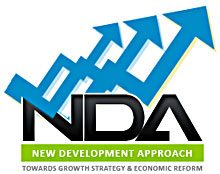 (Editor’s Note: We offer this as sixth in a series on Pakistan’s New Growth Strategy – see here and here and here and here and here. Although not directly related to the growth strategy being devised by the Planning Commission of Pakistan, the issue of education – and the results of the Pakistan Education Task Force are centrally important to that mission. We do hope you will have your say; if we do not speak up, then who will!)
(Editor’s Note: We offer this as sixth in a series on Pakistan’s New Growth Strategy – see here and here and here and here and here. Although not directly related to the growth strategy being devised by the Planning Commission of Pakistan, the issue of education – and the results of the Pakistan Education Task Force are centrally important to that mission. We do hope you will have your say; if we do not speak up, then who will!)


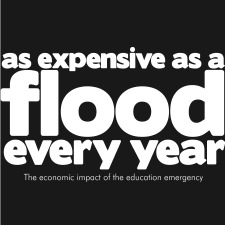
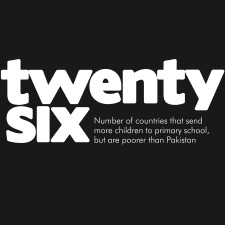
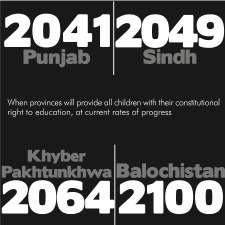
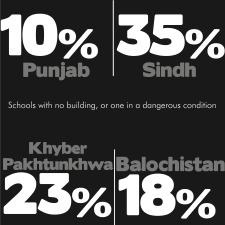
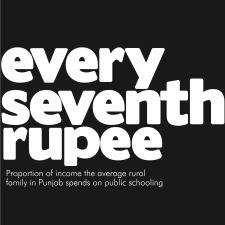
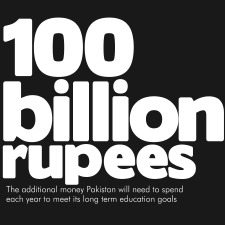
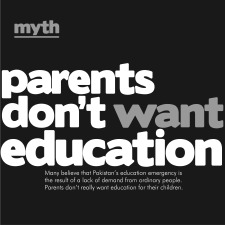
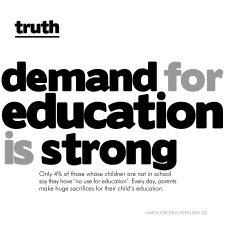

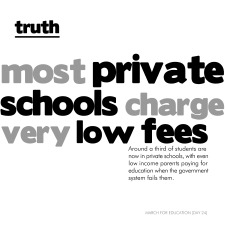
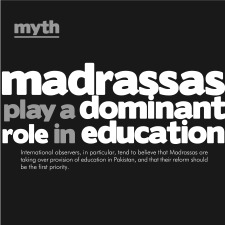
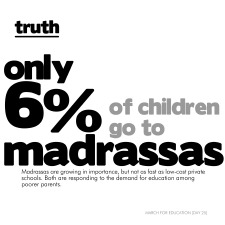
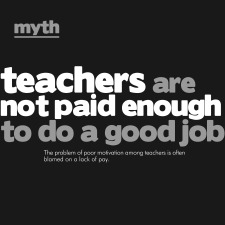
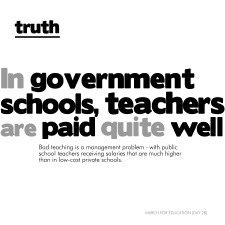



















































I find the list of myths and truths most interesting. So many of those myths are what people cite to explain the problem and they lead to inaction. At a basic level I do think it is simply a question of money and if we really consider education important then we start spending on it. A monitoring of quality in education is the second suggestion I would make.
@Deeda e Beena and otehrs
Maybe you are over-reacting. This is a blog post, not a strategy document. It is highlighting the need to do something. Do you disagree with that message. If not, why the anger. We we ourselves do not have specifics then why think that a mere blog post will. But let us heed their call and start all thinking about this. What would be so bad about that!
Why make everything an emotional personal attack, even when we agree with what is being said?
@S: Why do you think education is not the real issue , Its like a shock to hear a person saying thing like ” Instead you take up these non-issues that are not urgent and could be dealt with later, like this education or like bridges or short stories.”. Well, Sir the root cause of all the issues is education. Time has changed now , if we improve our education system now then trust me tomorrow you will not find any leader like the one we are having right now and none such issues will be created.
I am running an organization called “Youth Hope Organization” in Peshawar and i have seen my self the change in youth. They are now aware of all these issues but still what they focus on is the betterment of education just because that is the root cause.One of the heads of our sister organization that is “Organization For Youth And Development” raised voice for the betterment of education in Pakistan in Scotland at a conference of all the organizations in the world representing youth. That guy was none other then a simple MBA student. We have another example of a young student of Pakistani descent, Ali Moeen Nawazish was the first in the world to do 23 A Level subjects.
What do you think? Cant they be good leaders or will they do the same as the present leaders are doing?
Sir, Education is one of the biggest and common issue of any country of the world. I appreciate ATP for what they are doing and yes i agree , the issues you mentioned are issues as well but not that focusing than this issue.
A disappointing Post coming from MIT and Boston University scholars in Education!
What it tells us:
(1) Things are really bad for education in Pakistan.
(2) We (who?) should do something before it is too late.
Honestly, Doesn’t everyone know about these 2?
What is not there is the very Title of the Post viz. “DEVISING A GROWTH STRATEGY…………..”
I looked with a microscope and discovered ” No Strategy “in this Post!
By now all the predicaments, pitfalls and impediments are well known. Let us not regurgitate.
Let us Move to the next level!
Devise a Strategy to combat!
Scholars Please Help!
We are living in times where technology is filling the gaping void left in education. The following is a recent TED talk given by Khan Academy’s founder on how Khan Academy aims to provide a world class education for free to anyone, anywhere:
http://www.ted.com/talks/salman_khan_let_s_use_vid eo_to_reinvent_education.html
Our challenge is to take this knowledge base and make it available beyond the constraints of the internet and even electricity. Brick and mortor type investments are a thing of the past.